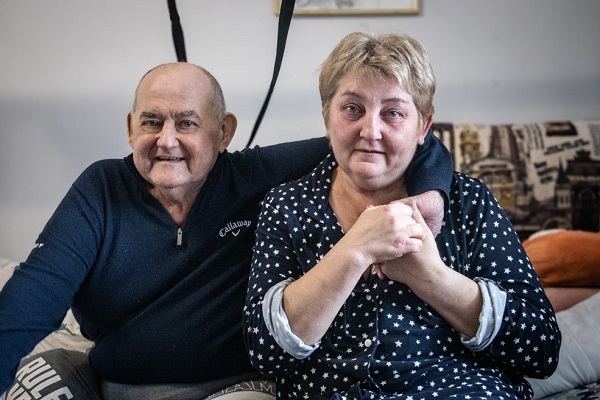 Anatoly and his wife, Tatyana;
Credit: © M.Monier - HI 2024
Anatoly and his wife, Tatyana;
Credit: © M.Monier - HI 2024
Handicap International (HI), an independent international solidarity association with branches in eight countries, including Luxembourg, has reflected on the impact of the Russia-Ukraine war on civilians over the past three years.
HI recalled that it has been present in Ukraine since February 2022. As the conflict rages on, the organisation said it is continuing to pursue its actions to assist people affected by the war. Since 2022, HI has supported a total of 208,139 people. In this context, HI said it "strongly condemns the repeated and ongoing damage to civilian infrastructure", adding that "the suffering of civilians must stop!" ! HI has thus called on those involved in the conflict to "take all possible measures to protect civilians".
The organisation recalled that many regions, particularly in the east and south of Ukraine, continue to be subjected to "constant and intense hostilities". "Whole swathes of the country are still virtually cut off from the rest of the world, with major difficulties in accessing basic needs such as water, food and healthcare," HI said in its statement. It added that "the massive destruction of civilian infrastructure has deprived people of their livelihoods and homes". Their damaged homes offer little to no protection from attacks or the "extremely harsh" winter conditions this time of year.
HI noted that the conflict has led to the internal displacement of 3.5 million people within Ukraine. It has also claimed almost 40,000 civilian victims since 2022, including more than 12,000 dead and 27,000 wounded according to ONHCR figures. The organisation described the physical injuries as "very serious", with some people losing limbs but also "losing all their independence and autonomy". The psychological traumas are described as "equally severe".
HI gave the example of 63-year-old Anatoly, who survived an air strike in the Donetsk region in April 2024. This former businessman hoped one day to be able to fully enjoy his retirement with his wife Tatyana, once the war was over. However, a missile hit the courtyard of his building, seriously injuring him.
"It was two years after the escalation of the war and two days after my daughter's wedding. I was outside in the courtyard and Tatyana called me to dinner. At the same time, there was a huge explosion," he recalled. "I was thrown against the wall of our house. The damage to my legs was terrible - I was bleeding profusely and in terrible pain. There were body parts everywhere. In a matter of minutes, my wife and I had to evacuate, leaving behind all our belongings, our whole life."
As HI explained, his injuries were so severe that Anatoly had both legs amputated in August 2024. He now lives confined to his bed on the ninth floor of a building in the town of Kamianske, in the Dnipro region. "I feel like I'm locked in a prison. The building's elevator rarely works and my wheelchair won't fit in it, so I'm stuck in the apartment I'm completely dependent on my wife for everything. Here, I don't even have access to a bomb shelter," he said.
Victoria Perez, a mental health specialist in Ukraine, explained: "Everyone in Ukraine is impacted by war in one way or another. Air raid alarms and shellfire can be extremely frightening and stressful, and can keep people on constant alert. Many people have family members or acquaintances who live or work close to the frontline, or who are themselves in an area close to the frontline. Civilians are constantly worried about their own safety and that of their loved ones". She continued: "One of the things we hear most often in the field is a deep sense of uncertainty about the future. This is a source of stress for many people, who feel that they can't make plans for the future, and that even their current situation could be jeopardised."
HI reported that it has supported a total of 208,139 people since the escalation of the war in 2022. The organisation has active bases in the Dnipro, Kharkiv and Mykolaiv regions, an office in Poltava and its headquarters in Kyiv.
For the past three years, HI has been mobilising its teams on the ground to provide inclusive humanitarian aid to people affected by war. This includes:
- identifying the needs of survivors of explosive weapons and referring them to other services within the organisation, for rehabilitation or psychological support, and when the organisation cannot meet their needs (e.g. provision of food), HI refers them to other local and international humanitarian actors;
- strengthening access to quality physical and functional rehabilitation, mental health and psychosocial support services, particularly for people with disabilities, their caregivers and healthcare professionals;
- providing financial support to people impacted by the war, people with disabilities and vulnerable households affected by the conflict, so that they can cover their basic needs;
- raising awareness among civilians and other humanitarian actors of the dangers of explosive remnants of war and shelling, particularly in areas that are difficult to access or that have once again come under Ukrainian control;
- facilitating the rapid delivery of humanitarian goods to conflict-affected populations through shared storage and transport services.








